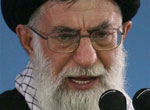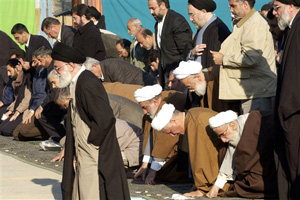 AP: Iran’s supreme leader pushed defiant senior clerics to throw their support behind the government Tuesday as he began a 10-day visit to the holy city of Qom, hoping to end a split in the powerful religious establishment over last year’s disputed elections.
AP: Iran’s supreme leader pushed defiant senior clerics to throw their support behind the government Tuesday as he began a 10-day visit to the holy city of Qom, hoping to end a split in the powerful religious establishment over last year’s disputed elections.
The Associated Press
 TEHRAN, Iran (AP) — Iran’s supreme leader pushed defiant senior clerics to throw their support behind the government Tuesday as he began a 10-day visit to the holy city of Qom, hoping to end a split in the powerful religious establishment over last year’s disputed elections.
TEHRAN, Iran (AP) — Iran’s supreme leader pushed defiant senior clerics to throw their support behind the government Tuesday as he began a 10-day visit to the holy city of Qom, hoping to end a split in the powerful religious establishment over last year’s disputed elections.
Ayatollah Ali Khamenei, who has the final say on all state matters in Iran, publicly supported President Mahmoud Ahmadinejad during the June 2009 presidential elections and endorsed his disputed victory in the vote. But a majority of senior clerics in Qom didn’t side with Ahmadinejad and have increasingly adopted a critical language against the government.
The dispute is damaging for Khamenei because the Qom ayatollahs have wide public followings. More significantly, it is embarrassing for a system based on the idea of rule by clerics.
In recent weeks, authorities have blocked the websites of at least three senior reform-minded clerics to limit their access to the public and their supporters.
Khamenei has reportedly made several secret visits to Qom — the revered city that is the center of Iran’s clerical establishment — in recent months aimed at winning support from the defiant clerics. But so far there has been little sign of a change in heart among the ayatollah.
Minutes after he arrived in Qom, 130 kilometers south of the capital Tehran, on Tuesday, Khamenei told the clerics that they should give priority to supporting Ahmadinejad’s government.
“Solidarity with the three branches of power needs to be strengthened further day by day, specifically with the executive branch (Ahmadinejad’s government), which has a lot of burdens on its shoulders,” Khamenei speaking to a crowd in a square near Qom’s holiest shrine. His speech was broadcast live on state television.
“Spreading rumors and ignoring the services (provided by the government) is not at all in the country’s interest,” he said.
Grand Ayatollah Nasser Makarem Shirazi, one of the top 10 clerics in Qom, accused Ahmadinejad’s government last month of lying about the country’s economic situation.
“Statistics about reducing inflation are constantly released but contradict what the people see by their own eyes,” Shirazi was quoted by the media as saying. “When state statistics don’t correspond with reality, people lose confidence in government.”
Iran’s central bank says inflation rate is under 10 percent though many experts say it is more than 20 percent in certain daily needs of people.
Iran’s parliament speaker Ali Larijani, who is close to Khamenei, insisted on Sunday that “there is no gap between the leader and the senior clerics,” according to the semi-official Mehr news agency.
Khamenei’s extended visit to Qom is also an opportunity for him to boost his own religious credentials in the strict traditions of Shia Islam’s religious hierarchy.
Khamenei is considered by some Shiites in Iran, Lebanon and elsewhere to hold the highest clerical rank in Shia Islam, the “marja-e taqlid,” meaning an “object of emulation.” But he doesn’t officially hold the title: Qom’s clerics have never publicly recognized him as such, and he has never published his “Treatise,” a book of his teachings, as all other marjas do.
Diehard supporters of Khamenei are campaigning for him to publish his treatise and secure his status, putting pressure on Qom’s clerics to support him.
Iran’s opposition websites said Khamenei’s trip to Qom was taking place under extensive security measures together with costly propaganda to draw a large crowd to give the leader a spectacular welcome.
Khamenei, who succeeded the charismatic father of the Islamic Revolution Ayatollah Ruhollah Khomeini as supreme leader in 1989, has stood against waves of reform demands and political upheavals to preserve the hard-line, anti-U.S. rule of clerics in the past two decades.
But there are now deep scars in Iran’s ruling system from the unprecedented violence and political dissent that followed the 2009 disputed presidential elections, when hundreds of thousands demonstrated in the street against Khamenei’s protege, Ahmadinejad. The opposition says Ahmadinejad won the election by massive vote fraud, a claim rejected by Khamenei.
In the postelection crackdown, more than 80 demonstrators were killed and hundreds of activists and pro-reform figures were arrested, according to opposition sources. The government puts the number of confirmed deaths at 30.


